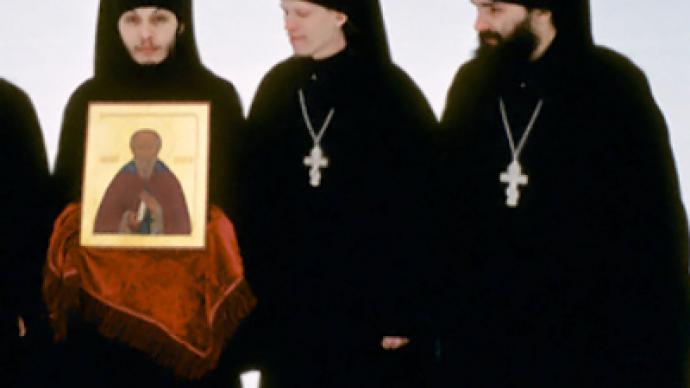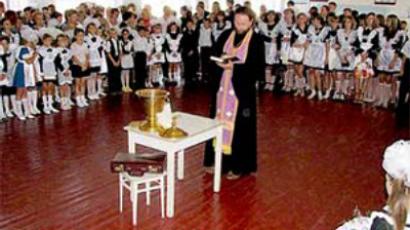Is religious freedom deteriorating in Russia?

A US panel added Russia to its watch list of 11 countries which it believes are regressing in the area of religious freedom. While this raises several genuine problems in Russian society, some arguments seem flawed.
The annual report by the Commission on International Religious Freedom (USCIRF), a Congress-backed agency of experts was highly critical of the developments in Russia, saying the country is deteriorating in terms of religious freedom.
Russia was added to the watch list, which also includes Afghanistan, Belarus, Cuba, Egypt, Indonesia, Laos, Somalia, Tajikistan, Turkey, and Venezuela, as countries where religious minorities are mistreated, and believers face official restrictions.
Alleged persecution
The commission claims Russian authorities are increasingly intolerant towards religious groups not controlled by the Russian Orthodox Church, all the way from minor sects such as Jehovah's Witnesses or Old Believers, to Russia’s second-largest religious community of Muslims.
It cites cases where Muslim religious texts were ruled extremist by Russian courts, which automatically puts them on a nation-wide ban list.
One of the most outrageous cases is the ban of works by Turkish scholar Said Nursi, which sparked much criticism in the Muslim community. The ban originated in security investigations against several Turkish-related groups operating in Russia, which grew out of proportion.
The problem does exist, admits Farid Asaddullin from Russia’s Council of Mufti. “There are cases where Muslims’ rights are violated,” but he said the problem “gradually gets solved."
The core of the problem is the lack of expertise in Islam among people on whom courts call to give advice on religious texts, and the issue receives high profile attention.
Asaddulin disagrees that Islamic worshippers are in a worse position now than several years ago.
“The report [of the USCIRF] should have mentioned the number of mosques built in Russia over the recent 10 to 15 years and religious schools which have been opened in most of Russia’s regions.”
Maksim Shevchenko, journalist and member of Russia’s Public Chamber, a public body supervising human rights violations in the country, is more critical.
“Some officials in Russia believe there is one traditional belief system in Russia, and all the rest should be either pushed out of Russia or pressed down,” he said, calling the situation “a disgrace for the country."
He believes the USCIRF report “is absolutely accurate in describing the situation in Russia from the American point of view.”
One of the non-traditional religions in Russia is Vaishnavism, a tradition in Hinduism focusing on worshiping the one god under the name Vishnu, Krishna and others depending on particular branch. It’s a major religion in India, but for Russia, it's a relatively new faith. It was viewed with much suspicion in the late years of the Soviet Union, and believers had to worship in secret.
The Vice-President of the Centre of Societies for Krishna Consciousness in Russia, Brahman Radha Damodar, agrees with the USCIRF report that there is an unofficial discrimination against the religion from local authorities, for example, where property rights are concerned. Another problem he mentions is lack of media coverage of Vaishnavism.
“Hinduism as a religious system is so little studied that the majority of Russians fail to distinguish between Buddhism and Krishnaism. It results in the white areas being painted black by absurd wild speculations,” he said, adding that there are groups interested in promoting public ignorance. They try to scare people with a “threat posed by sects” for personal gains, according to the Brahaman.
But he also says the situation is a far cry from the worst times when Vaishnavism was outwardly oppressed.
“We can now openly practice our religion, speak of our spiritual values, distribute spiritual literature, bring our children up in the spirit of non-violence, humane attitudes, respect for law, and the people of other faiths.”
Another minor religious group in Russia are shamans. They worship nature and spirits, and the belief is indigenous to several peoples in the country.
According to Ai-Churek Oyun, known as one of the most powerful shamans in the republic of Tyva, it’s the nature of shamanic beliefs, rather than human malice, which keeps the number of shamans low.
“I don’t believe in shamans in big cities, like in Moscow. There shouldn’t be those. I’ve travelled to America, to Europe, and worked there, and I know how difficult it is. A shaman must be on land of his own. And foreign lands are little help for him,” she said.
“Unprecedented power”
A cause of concern singled out by the USCIRF report is a body in the Russian Ministry of Justice, which has “unprecedented powers to control and monitor religious groups." The Board for Religious Studies is meant to issue ad hoc advice for the ministry on religious groups submitting paperwork for registration.
The uproar among Russian human rights activists was due to the new composition of the body, rather than the scope of authority. Critics say several of its members including the chairman are biased, and accuse them of witch-hunting on religious grounds.
“People on the board are not experts on religion, but rather incite religious hatred in our country,” claims Maksim Shevchenko, who is highly critical of the board.
He said that so far the board has not been requested by the ministry to give any official advice. But its members were giving interviews, which “confirmed the worst expectations” of human rights activists.
Andrey Kuraev, Orthodox theology expert and priest of the Russian Orthodox Church, has a different view of the controversial board:
“The life of religious organizations only in small proportion depends on who will act as a collegial advisor for the interior ministry. The board has no real power. Then again, the criteria of extremism is set by a law rather than the board. And their decision is but one of the opinions, while ultimately it’s the court ruling which matters.”
He says the criticism of the board and its new composition is “about personal score-settling.” As for using the board to gain leverage on some organizations, a scenario critics warn about, Kuraev says “it is unlikely."
Justice Minister Aleksandr Konovalov dismissed criticism, saying the board’s authority “is legally outlined and has mechanisms of control; the authority actually is not that big, while the board's decisions are mere recommendations.”
However, according to Shevchenko, “the scandal is so big that now the Ministry of Justice is rumored to be preparing a fundamental change of the board by giving membership to several famous lawyers, theology experts, and human rights activists.”
Devil in the details
While many examples of religious intolerance cited by the US commission report do depict genuine problems in Russian society, some may raise questions. It mentions a case at St. Petersburg University of the Ministry of Internal Affairs, where a textbook presented the history of Russia in the 20th century as a conflict between communism and Zionism. The 1,000 copies of the book were recalled “after protest from the Jewish community and human rights groups.”
What the report fails to mention is that an internal investigator determined that the author, who was 80 years old at the time of the scandal, essentially tricked his colleagues into publishing his work. When the nature of his book, filled with wild conspiracy theories, was revealed by the media, the university acted to sack the teacher, and apologized to the people he offended. Students never saw the text.
In another case, a lawsuit was pressed by the Pentecostal church against entertainment TV channel 2x2 over content on the South Park comedy show. The suit ended in favor of the channel, but the USCIRF cites it as an example of misuse of legislation protecting religious groups rather than a normal solution of a legal dispute.
Sergey Chapnin, who heads the official newspaper of the Russian Orthodox Church, believes the document is cherry-picking its examples to back its arguments.
“There are examples of Orthodox Christians' rights being violated, but they are never cited by American monitors despite our requests. At the same time, Americans refuse to see the destructive nature of some religious movements. In Europe, on the other hand, the approach is differentiated, and some organizations are widely acknowledged as harmful.”
The document goes on with several pieces of advice for both Russian and American governments on how to deal with the situation.
Russia, for its part, is told to amend its legislation, which mentions four predominant religions – Orthodox Christianity, Islam, Judaism, and Buddhism – as “traditional," claiming it violates the rights of members of other religions. The document doesn’t explain how the situation in Russia is worse than, say, mentioning Roman Catholicism as the traditional religion in Poland, or Judaism as the state religion in Israel.
As for the US government, some of the panel’s suggestions are quite unorthodox. The report suggests linking religious freedom in Russia with the country’s accession to the World Trade Organization, and the lifting of the Jackson-Vanik amendment, the trade regulation that was imposed against the Soviet Union in protest against the restriction of the immigration of Russian Jews. What Russia’s trade relations have to do with religious freedoms is not revealed.
According to Chapnin, “in Russia, the American model of relations between the state and religions is not traditional, not applicable, and does not work.”













